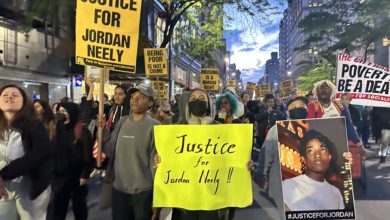 Photo: Clark Kissinger |
Robert R. Bryan, lead counsel for Mumia Abu-Jamal, issued an appeal for a new trial on July 1, 2005, citing racism in the jury selection in the 1982 trial, along with other flagrant violations of the law. Although Mumia was granted �relief� in 2001 by a District Court, the District Attorney appealed, and Mumia has been confined to Death Row�now for 23 years.
If the most recent appeal and arguments for relief are denied, the only appeal left would be to the Supreme Court. The Supreme Court only accepts 2 to 3 percent of cases each year to be heard for consideration.
�The heat is on,� Bryan says. He urged all social justice activists to rally to Mumia�s defense. �People need to demonstrate, they need to make noise, they need to write letters. We need activist support.�
Mexican braceros demand unpaid wages
 Photo: Sergio Dorantes |
On August 17, a group of former braceros�Mexican migrant workers who toiled in the United States in the 1940s and afterwards�stormed the Mexican Interior Ministry demanding compensation for unpaid labor. The federal police beat the protestors and arrested ten. Two days earlier, rallies in solidarity with the bracero movement occurred in 11 U.S. cities and many other cities in Mexico. In Los Angeles, the braceros occupied the Mexican consulate and blocked the door for several hours. The Alianza Binacional Braceroproa, Latino Movement USA, and the ANSWER (Act Now to Stop War and End Racism) Coalition held a press conference in support of the bracero struggle.
Surviving ex-braceros, who collectively claim hundreds of millions of dollars in unpaid labor, argue that the Mexican government is waiting for them to die before it undertakes any meaningful compensation program.
Continued theft of Native resources
 Photo: Bill Hackwell |
A class action lawsuit representing over 500,000 Native Americans claims that the U.S. government owes $176 billion to Native families for lost revenues from oil, gas, timber, and grazing leases on Native land allotments.
The 1887 Dawes Act allotted 80- to 160-acre parcels of land to Native American families in the form of �Individual Indian Trusts.� It was an attempt to break down tribal identities and tribal ownership. The lands were held in trust by the U.S. government and turned over to business speculators and white farmers. In the 118 years since the Dawes Act was passed, those leases have earned U.S. companies billions of dollars in revenues.
The Department of the Interior, which was supposed to pay the Native leaseholders, paid out ridiculously small amounts to Native families. Sam Valdez, one plaintiff, was receiving $154 a year for four oil and gas rich land allotments.
In July 2005, U.S. District Judge Royce Lamberth slammed the Interior Department�s �unremitting neglect and mismanagement.� Judge Lamberth said, �After all these years, our government still treats Native American Indians as if they were somehow less than deserving of the respect that should be afforded to everyone in a society where all people are supposed to be treated equal.�
Of course, it�s about more than respect. The U.S. government needs to turn over the billions of dollars it has stolen from the Native communities.






